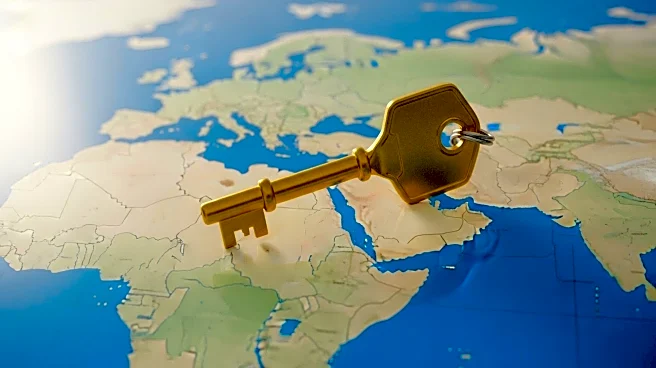What's Happening?
President Trump has introduced a 21-point initiative aimed at resolving the ongoing conflict in Gaza and fostering broader Middle East peace. The plan includes the immediate release of hostages, the removal of Hamas from power, and the destruction of its offensive weapons. It also proposes amnesty for Hamas members who commit to peaceful coexistence with Israel, allowing them to leave and potentially return to Gaza. The initiative suggests a temporary ceasefire transitioning to a permanent arrangement, with gradual Israeli withdrawal from Gaza. An alternative administration in Gaza, not affiliated with Hamas, and an international reconstruction framework are also part of the plan. The Palestinian Authority is expected to undertake reforms to strengthen its institutions, with management authority over Gaza transferred only after successful implementation. The plan envisions a future Palestinian state conditioned on reconstruction and reform, with international security coordination and a monitoring mechanism.
Why It's Important?
The initiative represents a significant U.S. effort to address the longstanding Israeli-Palestinian conflict, potentially altering the geopolitical landscape in the Middle East. If successful, it could lead to a reduction in hostilities and pave the way for a more stable region. However, the plan faces opposition from both Israeli Prime Minister Netanyahu and Hamas, who have expressed concerns over specific clauses. Netanyahu is particularly opposed to the disarmament of Hamas and the path to a Palestinian state, while Hamas objects to the disarmament clause and the composition of a post-war government. The plan's success hinges on overcoming these objections and achieving consensus among key stakeholders.
What's Next?
President Trump is set to meet with Prime Minister Netanyahu to discuss the initiative further. The meeting will focus on bridging gaps and addressing objections raised by Netanyahu. The U.S. hopes to finalize details and gain broader acceptance from Arab states and other international stakeholders. The outcome of these discussions could determine the feasibility of the plan and its potential implementation. Meanwhile, pressure from Arab states accepting the plan may influence Hamas's stance, potentially leading to a breakthrough in negotiations.
Beyond the Headlines
The initiative could have long-term implications for U.S. foreign policy in the Middle East, potentially enhancing its role as a mediator in regional conflicts. It also raises ethical questions about the balance between peace efforts and the rights of affected populations, particularly in terms of displacement and governance. The plan's focus on reconstruction and reform highlights the importance of sustainable development in conflict resolution.









